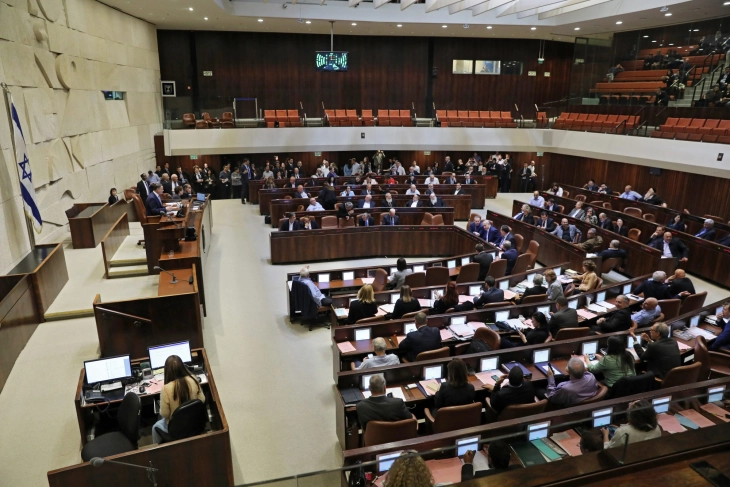Israel's parliament passes divisive judicial reform bill
- Despite massive opposition, Israel's parliament passed a key element of the controversial judicial reform bill on Monday after a majority of the 120 lawmakers voted in favour.
- Post By Ivan Kolekevski
- 17:52, 24 July, 2023

Jerusalem, 24 July 2023 (dpa/MIA) - Despite massive opposition, Israel's parliament passed a key element of the controversial judicial reform bill on Monday after a majority of the 120 lawmakers voted in favour.
After days of debate, 64 of the Knesset's 120 lawmakers backed the bill that restricts the Supreme Court's powers. The opposition boycotted the vote.
The law is part of a larger package that critics fear will undermine Israel's democracy and that has sparked mass protests in the country for months.
The new law means it will no longer be possible for the Supreme Court to judge a decision by the government or individual ministers as "inappropriate," prompting fears that this could lead to corruption and arbitrary appointments to key posts and dismissals.
The government of Prime Minister Benjamin Netanyahu accuses the judiciary of excessive interference in political decision-making.
After the vote, Israel's Justice Minister Yariv Levin praised the "correction of the judicial system." As a first step, he said, parliament had regained the powers it had been stripped of.
The Israeli state has no written constitution and is based on a collection of basic laws. Therefore, the Supreme Court is of particular importance in upholding the rule of law and human rights.
For more than half a year, the controversial proposal has divided Israeli society, with thousands of people regularly taking to the streets to protest it.
The organizers of the demonstrations called on people to take to the streets after the "dictatorial law" was passed on Monday.
According to Israeli media, some 20,000 opponents of the judicial reform demonstrated in front of the parliament building in Jerusalem.
Parts of the military and the business community have also sharply criticized the proposed reforms.
More than 10,000 military reservists have said that they would no longer show up for duty if parts of the controversial plans were adopted. According to reports, this could significantly affect the readiness of the military.
On Monday, Israel's opposition leader Yair Lapid said he will petition the Supreme Court on Tuesday morning to halt the "unilateral abrogation of the democratic character of the state of Israel."
He also appealed to army reservists to wait for a Supreme Court ruling on the law before refusing to serve.
Negotiations for a compromise, mediated by President Isaac Herzog, which were reportedly under way up until the vote on Monday, were unsuccessful.
According to media reports, Lapid had said ahead of the vote, "With this government, it is impossible to reach agreements that will preserve Israeli democracy."
After the vote passed in parliament, Lapid spoke of an "unprecedented demonstration of weakness" by the prime minister.
Netanyahu had "become the puppet of a number of messianic extremists," Lapid said.
Netanyahu's coalition is the most far-right the country has ever had. The changes to the law also come as a result of pressure from Netanyahu's strict religious coalition partners.
However, experts have also pointed out that they also benefit Netanyahu in the face of an ongoing corruption trial against him.







